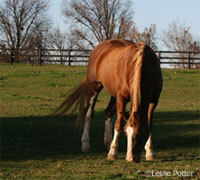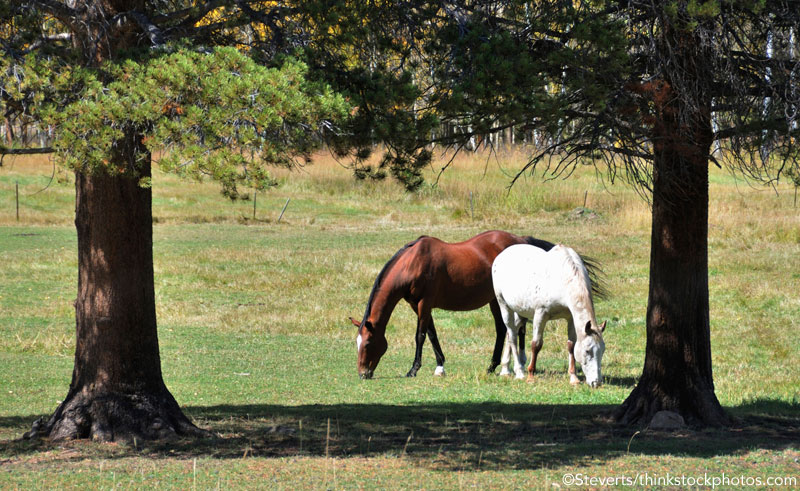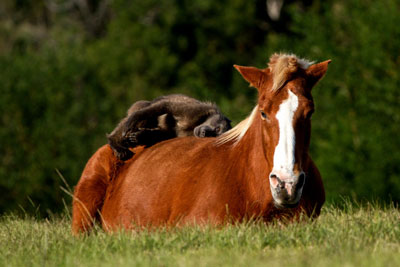
Horses have a legendary history of helping mankind in all types of weather, proving that they can withstand more than most seasons dish out. However, it is important to take precautionary measures before each season to ensure the health and happiness of your horse. Fall is no different as certain weather conditions and pesky visitors at this time of year can possibly cause harm to your horse’s health.
Dr. Leslie Easterwood, clinical assistant professor at the Texas A&M College of Veterinary Medicine & Biomedical Sciences (CVM), says the first thing to remember after the first freeze is to vaccinate your horse. Vaccinations for the following viruses and diseases are essential for the health of your horse: Venezuelan, Eastern and Western Encephalitis; Tetanus Toxoid; West Nile Virus; Strep; Equine Influenza; Rhinopnuemonitis; and Rabies (should only be given once a year).
“The most commonly encountered fall virus is West Nile Virus,” Easterwood said. “The other viruses and bacterial organisms are year-round, so it is important to have a year-round vaccination protocol.”
Deworming should also be year-round. “The most commonly encountered internal parasite that we deworm for specifically in the fall is Bots,” Easterwood said. “The fly vector responsible for Bots is usually less prominent in the winter, so we try to clear the adult Bots out of the gastrointestinal tract after the first freeze. All other internal parasites are encountered year-round, so it is important to have a year-round deworming protocol.” Read more >>
Another important factor to keep in mind as the colder weather approaches is supplying appealing drinking water. The colder weather makes the cold drinking water less attractive to horses. Less water intake leads to dehydration, and secondarily to colic. To avoid these side effects, owners can add electrolyte powder to the horse’s daily grain ration.
“Increased water intake, can also be accomplished by heating the water that is offered, but this option is rarely practical for most horse owners,” Easterwood added. “Electric water bucket warming devices are commercially available.”
The weather does not start to take a drastic drop in temperature until the winter months. However, starting protection plans in the fall is a good idea in case a freeze happens early. Easterwood recommends a wind break for the horses and a place to keep them dry when the weather is wet and cold.
Blankets are another popular option for horse owners. However, Easterwood notes that blankets are not necessary for every horse.
“For the vast majority of horses, it will never be too cold for them to live outside with no blanket,” Easterwood said. “Horses survive in very harsh winter environments with their natural hair coat. Those horses that would benefit from blanketing are those that are thin, debilitated, ill, or have no natural hair coat.”
“We artificially keep our show horses thin haired in the winter so that we can show them with no hair,” Easterwood added. “Show horses definitely benefit from blanketing in the winter, but most horses who are allowed to grow a natural hair coat do not need to be blanketed at all.”
Easterwood points out horses can actually sweat and overheat under blankets that are left on during the day when the temperature warms up. Especially in regions where the temperature varies significantly throughout the day, it would be best to refrain from blanketing healthy non-show horses. Read more >>
One last recommendation in the fall is to have a trained veterinarian check your horse’s teeth to ensure they are healthy.
“Horses are going to need more energy to function in the rigors of winter weather,” Easterwood said. “They will need more energy and fiber in order to keep their body temperatures warm. For this reason, having the teeth in good shape is essential.”
Fall preparation is necessary for a healthy and happy life in the winter. If you follow these simple guidelines and listen to the advice of your veterinarian your horse should be in tip top shape for the winter months.





i know they say that horses that have natural winter coats don’t neccessarily need blanketing in the winter, but what about senior horses? especially 30 yr old horses? are they still okay without blanketing or should they be blanketed just in case?
Should horses that have been bitten and have patches of hair missing be blanketed?
Don’t blanket your horse-even if it is an older one- unless they need it. If you blanket regularily, and theey are still out in a un-protected area, they will need their winter coat. If it is a particularily rainy, or windy day, blanket them if they show signs of discomfort or if they are shivering. If they shiver, that is a sure sign that they need help.
Source(s) I have grown up amongst many good horsemen/women and have boarded 20 horses over a winter, some of which needed spacial attention, and have cared for many older horses.
Luckily, our three horse’s get nice winter coats but…. one at 38 and another at 25, when they shiver or we “know” they will shiver soon…. they get “breathable” blankets on!!!
Fortunately my horse grows his own thick winter blanket. I think he could survive in the arctic! His food intake does go up though, despite him being an easy keeper.
My horse doesn’t need a blanket because she has a thick winter coat. Thank goodness!! The only thing to worry about is making sure she is getting enough food and that isn’t a problem because we give her grain along with her hay in winter for the extra calories. Also it is a time i get to spend with her because I somtimes handfeed her it and I also get to hear her impatient nickering!!